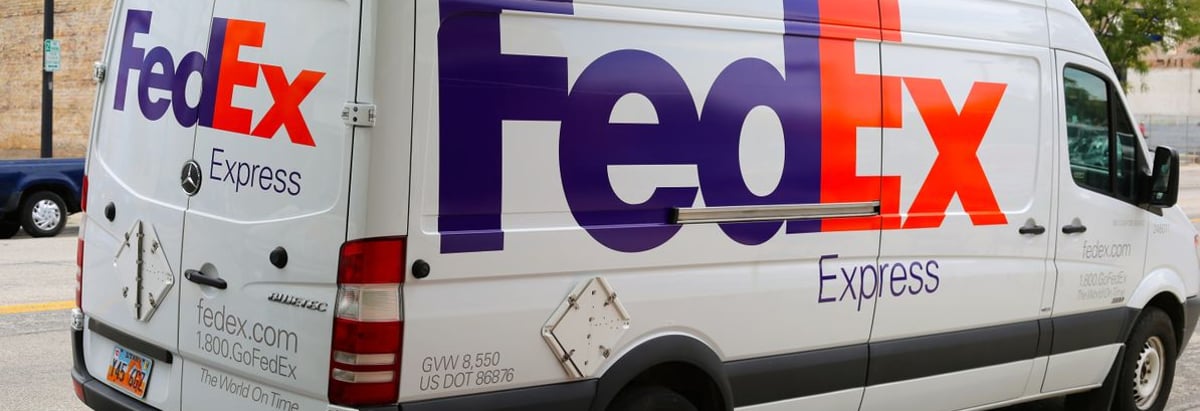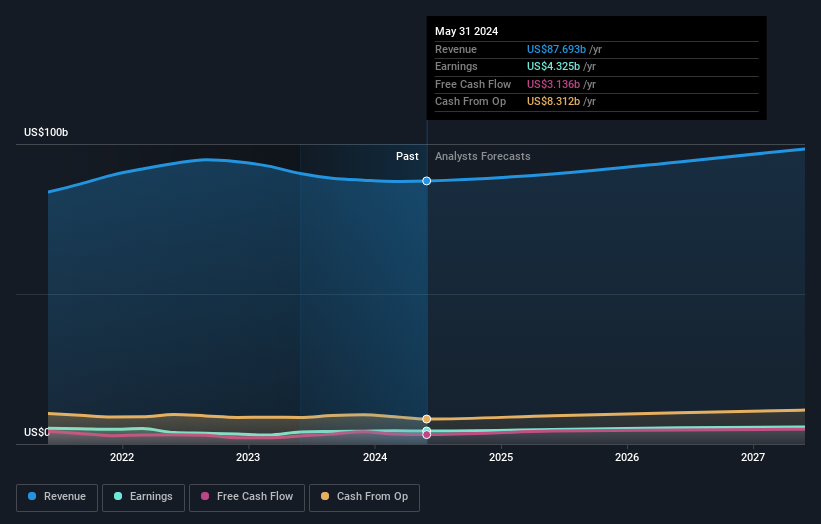- United States
- /
- Logistics
- /
- NYSE:FDX
Institutional investors are FedEx Corporation's (NYSE:FDX) biggest bettors and were rewarded after last week's US$2.9b market cap gain

Key Insights
- Significantly high institutional ownership implies FedEx's stock price is sensitive to their trading actions
- A total of 14 investors have a majority stake in the company with 50% ownership
- Insiders have been selling lately
A look at the shareholders of FedEx Corporation (NYSE:FDX) can tell us which group is most powerful. We can see that institutions own the lion's share in the company with 80% ownership. Put another way, the group faces the maximum upside potential (or downside risk).
And things are looking up for institutional investors after the company gained US$2.9b in market cap last week. One-year return to shareholders is currently 17% and last week’s gain was the icing on the cake.
In the chart below, we zoom in on the different ownership groups of FedEx.
See our latest analysis for FedEx

What Does The Institutional Ownership Tell Us About FedEx?
Institutional investors commonly compare their own returns to the returns of a commonly followed index. So they generally do consider buying larger companies that are included in the relevant benchmark index.
FedEx already has institutions on the share registry. Indeed, they own a respectable stake in the company. This suggests some credibility amongst professional investors. But we can't rely on that fact alone since institutions make bad investments sometimes, just like everyone does. If multiple institutions change their view on a stock at the same time, you could see the share price drop fast. It's therefore worth looking at FedEx's earnings history below. Of course, the future is what really matters.

Since institutional investors own more than half the issued stock, the board will likely have to pay attention to their preferences. We note that hedge funds don't have a meaningful investment in FedEx. Our data shows that The Vanguard Group, Inc. is the largest shareholder with 8.1% of shares outstanding. Meanwhile, the second and third largest shareholders, hold 8.0% and 6.1%, of the shares outstanding, respectively. Frederick Smith, who is the second-largest shareholder, also happens to hold the title of Top Key Executive.
A closer look at our ownership figures suggests that the top 14 shareholders have a combined ownership of 50% implying that no single shareholder has a majority.
Researching institutional ownership is a good way to gauge and filter a stock's expected performance. The same can be achieved by studying analyst sentiments. There are plenty of analysts covering the stock, so it might be worth seeing what they are forecasting, too.
Insider Ownership Of FedEx
While the precise definition of an insider can be subjective, almost everyone considers board members to be insiders. Management ultimately answers to the board. However, it is not uncommon for managers to be executive board members, especially if they are a founder or the CEO.
Insider ownership is positive when it signals leadership are thinking like the true owners of the company. However, high insider ownership can also give immense power to a small group within the company. This can be negative in some circumstances.
We can see that insiders own shares in FedEx Corporation. The insiders have a meaningful stake worth US$6.0b. Most would say this shows a good alignment of interests between shareholders and the board. Still, it might be worth checking if those insiders have been selling.
General Public Ownership
The general public, who are usually individual investors, hold a 12% stake in FedEx. While this size of ownership may not be enough to sway a policy decision in their favour, they can still make a collective impact on company policies.
Next Steps:
I find it very interesting to look at who exactly owns a company. But to truly gain insight, we need to consider other information, too. For example, we've discovered 2 warning signs for FedEx that you should be aware of before investing here.
But ultimately it is the future, not the past, that will determine how well the owners of this business will do. Therefore we think it advisable to take a look at this free report showing whether analysts are predicting a brighter future.
NB: Figures in this article are calculated using data from the last twelve months, which refer to the 12-month period ending on the last date of the month the financial statement is dated. This may not be consistent with full year annual report figures.
New: AI Stock Screener & Alerts
Our new AI Stock Screener scans the market every day to uncover opportunities.
• Dividend Powerhouses (3%+ Yield)
• Undervalued Small Caps with Insider Buying
• High growth Tech and AI Companies
Or build your own from over 50 metrics.
Have feedback on this article? Concerned about the content? Get in touch with us directly. Alternatively, email editorial-team (at) simplywallst.com.
This article by Simply Wall St is general in nature. We provide commentary based on historical data and analyst forecasts only using an unbiased methodology and our articles are not intended to be financial advice. It does not constitute a recommendation to buy or sell any stock, and does not take account of your objectives, or your financial situation. We aim to bring you long-term focused analysis driven by fundamental data. Note that our analysis may not factor in the latest price-sensitive company announcements or qualitative material. Simply Wall St has no position in any stocks mentioned.
About NYSE:FDX
FedEx
Provides transportation, e-commerce, and business services in the United States and internationally.
Established dividend payer and good value.
Market Insights
Community Narratives



